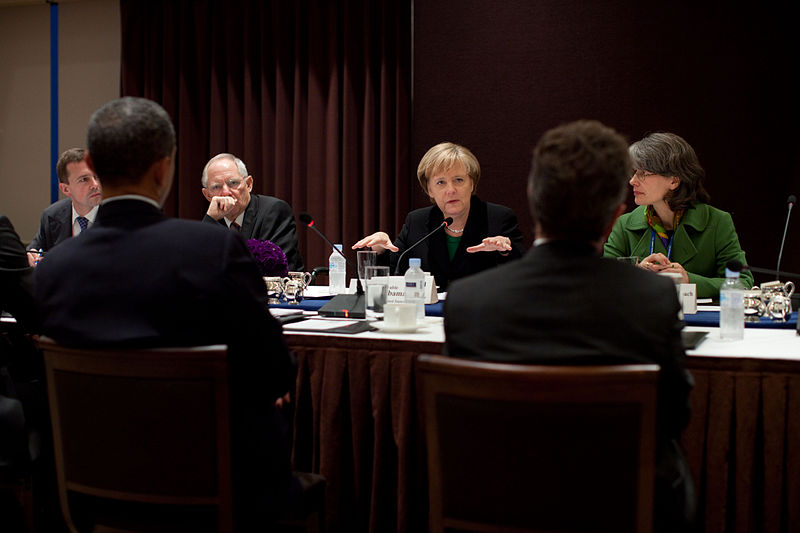
By Jason Patrick
International media outlets reported today that US President Obama and German Chancellor Merkel discussed potential resolutions for the crisis in Ukraine. They also referenced what US officials referred to as an “off-ramp” for Russian President Putin–suggesting discussions of possible exit strategies with which Moscow could gracefully step back from the ledge upon which it is precariously teetering. The question is: does President Putin feel the need to withdraw gracefully or otherwise?
So far, and in stark contrast to Moscow’s approach, Western leaders are pushing a soft-power approach. US and European capitals are proposing the Organization of Security and Cooperation in Europe (OSCE) send its multi-national representatives to Ukraine to monitor the situation and to ensure the rights of ethnic Russians are protected during the transition period. This would be the “carrot”. The “stick”-albeit a very small one” are the US and Canada’s discussions of holding a G7 meeting, which would notably exclude Russia as the 8th member of G8. The slightly larger stick remains the threat of unilateral sanctions currently being contemplated by the United States. These sanctions, however, remain vague and are unlikely to carry much weight with Moscow.
Press reports are characterizing Mr. Putin’s statement that military action would remain a “last resort” as a softening of his position, suggesting that this is a response to the sharp Western condemnation of his troop movements into Crimea. This may be a misreading of Moscow’s actions, however. As the Russian military has insinuated itself into key military installations and seized key infrastructure in the Crimea, it has effectively occupied the territory and isolated it from the rest of the country. At this point, Putin’s actions more closely resemble a tactical pause, rather than a cautious hesitation. It is most certainly not a question of his resolve.
At this point, Moscow seems to have the ball firmly in its court. Given its hold on the Crimea and the threat of further movement into parts of eastern Ukraine, Russia is currently in a strong position to influence the outcome of Ukraine’s near-term political future. Mr. Putin holds that former President Yanukovych’s removal was an illegal coup. As such, any steps to replace him will be illegitimate in Moscow’s eyes, which will only encourage Putin to keep his military forces in place. Similarly, Russia will undoubtedly support calls for referenda in the Crimea, and the eastern cities of Donetsk, Kharkiv, and Dnipropetrovsk.As Russian support in these areas is not universal, opposition will likely manifest as protests, which have a high probability of turning violent. Any major violence will be interpreted by Moscow as a threat to their interests and will serve as adequate justification for further troop movements into Ukrainian territory.
As Moscow appears to be biding its time and solidifying its position, the West must take action to ensure Russia cannot act with impunity. In addition to sanctions and visa bans, the US and NATO need to reciprocate by holding large-scale exercises of their own. Moscow will clearly see such actions as an aggressive countermove and its rhetoric will portray it as Western aggression. Such a move comes with the inherently increased risk of a miscalculation on either side, as well. However, the US and NATO need to signal to Russia that it cannot contravene international laws or breach multi-lateral agreements, to which it is a signatory. It also needs to signal to Ukraine that it is a European ally that enjoys the support and protection of its neighbors.




